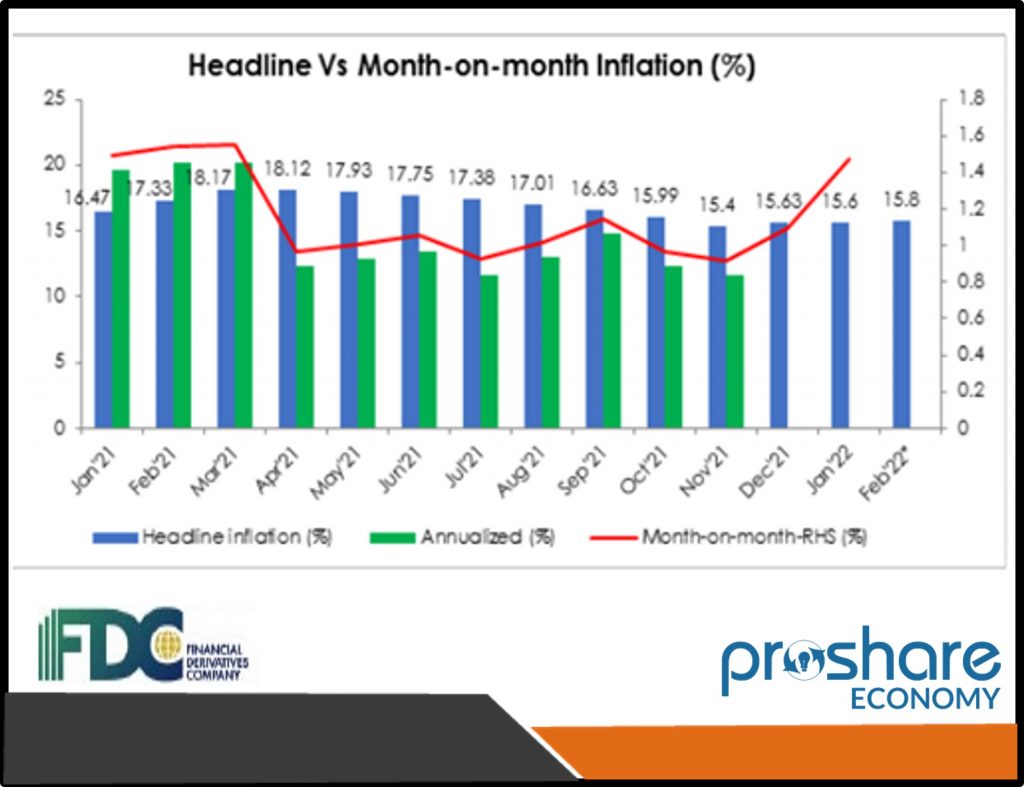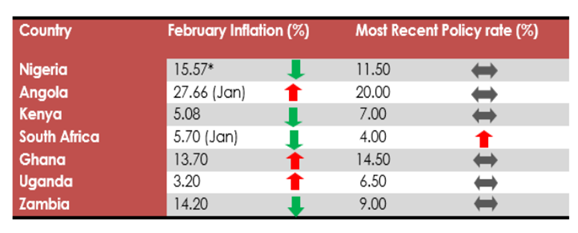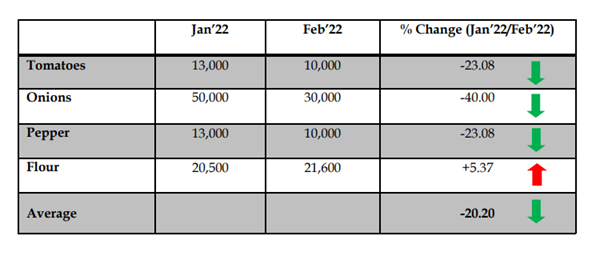Inflation to Decline Marginally Ahead of Cost Pressures in March

The NBS is scheduled to publish the headline inflation and related data for February on Tuesday, March 15. Based on our time series model and survey of commodity markets in the Lagos Metropolis, official headline inflation is projected to decline marginally by 0.03% to 15.57% in February. The survey was carried out at the end of February, which was the beginning of the petrol scarcity and adulterated fuel scandal. Therefore, the impact of the spike in the black market price of petrol and the skyrocketing of diesel price had not manifested in retail prices.
However, core inflation (inflation less seasonalities) is estimated to increase by 0.11% to 13.98%. Even though domestic food prices are falling due to weak aggregate demand, consumer price resistance and late harvest; living costs continue to climb. One price propelling factor is the pass-through effect of higher energy prices on transport and logistics costs. Notably, the scarcity of fuel has created some level of market inefficiencies and encouraged arbitrage practices. Currently, petrol and diesel are selling at different prices across the country, with some selling as high as N250/litre and N650/litre respectively.

Other inflation stoking factors
- Supply chain disruptions & currency pressures stoking imported inflation
The Russian-Ukraine conflict is worsening global supply chain disruptions, pushing up commodity prices. In February, the global food price index reached an all-time high of 140.7points due to an increase in the vegetable oils, dairy & cereals price indices. Year-to-date, the price of wheat and corn surged by 64.79% and 21.65% respectively. Rising global commodity prices, coupled with currency pressures is pushing up the price of import-dependent commodities like flour. The price of a 50kg bag of flour is currently N21,600, up 5.37% from N20,500 last month.
- Spike in domestic airfares adding to price pressures
Domestic airfares are up 100% with the new price floor set at N50,000. This is due to higher jet fuel prices, spare part imports and forex scarcity. A Lagos-Abuja return ticket is now selling for over N100,000. This will further heighten inflationary pressures.

Data Breakdown
Month-on-month inflation, which is a better reflection of current prices and inflation expectations is expected to rise to 1.52% (19.82% annualized) from 1.47% (19.24% annualized).
Annual food inflation to fall again but imported food inflation will remain elevated
The year-on-year food index is projected to fall slightly by 0.14% to 16.99% due to weak aggregate demand and late harvest of major agric produce. The price of tomatoes, pepper and onions declined by an average of 28.72% in February before increasing slightly in early March due to higher logistics costs. Most traders were unable to pass-on the bulk of the additional expense to consumers due to weak aggregate demand and price resistance. Another noticeable trend during the month is an increase in the price of commodities with import content, suggesting that imported inflation will remain elevated. The price of flour rose by 5.37% to N21,600 per bag due to rising global wheat prices and persistent exchange rate pressures.

Core inflation to increase on higher energy costs and persistent currency pressures
Core inflation, which is inflation less seasonalities is expected to increase by 0.11% to 13.98%. This is primarily as a result of higher energy costs and persistent currency pressures. The naira lost 1.40% to close the month at N578/$.
Sub-Saharan African – Mixed inflation trend amid rising global prices & higher energy costs
Inflation trend across Sub-Saharan Africa is mixed. Of the four countries under our review that have reported their February inflation data, two posted declines and two recorded increases. The reduction in Kenya and Zambia’s inflation is as a result of lower food prices. The Kenyan government has also reduced its electricity tariffs, easing cost pressures.
Most of the monetary policy authorities left their policy rates unchanged at their last meetings, with the exception of South Africa, who has raised rates twice in the last two consecutive meetings.
Conclusion
Headline inflation is projected to reach an inflection point in February and increase in the coming months due to supply-side constraints and cost pressures, principally the knock-on effect of the spike in diesel prices (retail price currently at N650/litre). The on-going hostilities between Russia and Ukraine will continue to weigh on the global commodity supply chain with a trickle-down effect on domestic prices. The MPC will be meeting later in the month. The risk of a reversal in the current inflation trend could prompt an increase in interest rates.






